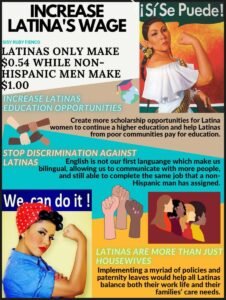This second semester of my first year in college became very difficult, but not impossible to complete. I say this because at the beginning of the semester, I was working a Full-time job while being a Full-time student because I needed to support my single mother. This responsibility taught me that you need to sacrifice certain things (sleeping, spending time with yourself/family, my mental health) to achieve your goals. I eventually had to quit my job to focus on my academics because my grades were not the best. Unfortunately, later on I contracted COVID-19, this got me behind in all of my classes. I remember I could not even open my eyes because of a strong headache I had, it became very difficult to complete my assignments. Until now, I still do not have my smell sense back. Not only that, my mom and I were struggling financially where at some point I did not have internet/Wi-Fi to complete assignments or even attend classes. At that point I remembered, my mental health was at the lowest because I couldn’t have a job because I was sick, and it was difficult to find a solution. I knew over time things would get better and I would be able to go back to normal. Eventually, I had to catch up on my classes, get in contact with my professors, and sacrifice my sleep to complete all missing assignments. Even though my grades are not the best right now, I am still proud of myself for getting through one of my lowest points in life and for at least passing my classes.
Throughout this semester we read multiple articles, monologues, speeches, letters, and all of them have a deep meaning in a different way. One of my favorites is Wollstonecraft’s dedicatory letter. I say this because I felt connected to her words, “to improve the morals of their fellow-citizens by teaching men not only to respect modesty in women but to become modest themselves, as the only way to deserve women’s respect”. This quote spoke very loud to me because I am tired of society telling women what to do, what not to do and to “respect” ourselves, how about men learn how to respect us and themselves. In addition, the career I chose, Civil Engineering is male-nominated, and women do not get as much respect unless we put our foot down and let them know who we are. I agree with Wollstonecraft because I stand for equal education for men and women. My other favorite assignment was the Discourse Community project because it made me more aware of my surroundings. I learned that I am part of these main four discourse communities: I am a Latina, a New Yorker, Gen Z, and a college student. My roots make me feel empowered because it is part of who I am. I was born in South America, Ecuador and grew up in Colombia and I enjoyed my childhood spending around the Latinx culture. I bring my roots everywhere I go, so I brought them to New York. I came here when I was 9 years old, therefore I spend my other half of my childhood in the Bronx. Growing up in New York City has developed my adaptation skills because I have learned to adapt to the weather, to the language, and the culture. So far, I am the youngest and the only Gen Z in my family attending to college. I like my generation because we are more ethnically and gender diverse than any previous generation. This is my first year in college, and I share many similarities with other college students. For example, we are determined, resourceful, inspired and most importantly, we are not afraid to take risks. I enjoyed reading and learning from this English course because it developed my reading and writing skills.
Even though, I did not complete all my assignments later on the semester because of my complications, I am still proud that I got to learn from these assignments. In addition, I felt connected to my classmates because I was able to read their work, interact and learn from them. I also submitted late assignments, but better late than never. This semester has been a tough experience, but I am glad we are all in this pandemic together and understand/help each other.




